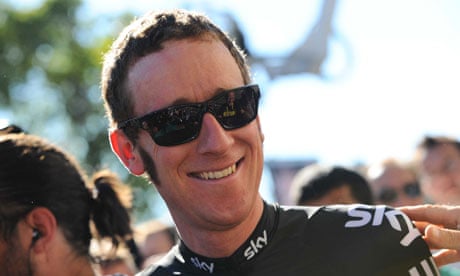For more or less everyone else on the planet, completing 2,200 miles of cycling over three weeks would be enough reason to begin the mother of all post-workout binges. And that's without the understandable urge to celebrate one of the greatest achievements by a British athlete.
For Bradley Wiggins, however, his Tour de France triumph in Paris came just six days before another pressing date in the cycling calendar: the men's Olympic road race, where he hopes to help lead fellow Briton Mark Cavendish on a sprint to gold. Four days after that comes Wiggins' own chance to add to his haul of Olympic medals, in the time trial.
He is not alone in having to postpone much-needed rest and recreation. Three of Wiggins' Olympic team-mates, Cavendish, Chris Froome and David Millar, also completed the Tour de France.
And while some Olympians centre four-year training programmes on their one event, others will be straining for yet another peak at the end of a gruelling season of exertion. Take Jordi Alba: it is little more than three weeks since Barcelona's newly-signed left back helped Spain triumph as one of the stars of Euro 2012. He must now do it all again for Spain's Olympic squad.
While Wiggins might see the nine-day gap between the Tour de France finale and his time trial as "a holiday", his recovery regime wouldn't seem particularly restful to many. Even briefly back at home in Lancashire, he is likely to keep his legs spinning on a bike every day, and by Wednesday he and his Team GB colleagues will be back into 100 mile-plus training rides.
"Cyclists tend to keep quite active – for example, they ride on their rest days," said Jo Corbett from the sport and exercise science department at Portsmouth University. "In terms of recovery between events it's very dependent on what you're trying to recover from. The recovery of a cyclist might be very different from say, a rugby player. For a cyclist, one of the things is they're using a large amount of glycogen each day, so they're trying to replenish their muscle glycogen. That's very different from a rugby player, who might have impact injuries or muscle damage."
Recovery for Wiggins, in contrast to a footballer such as Alba, is "not necessarily easier, just different", Corbett said. "The demands of a three-week stage race are very different from a 90-minute, intermittent activity. Muscle soreness is more pronounced when you're running rather than cycling because you've got that eccentric muscle load so that causes damage at the muscle fibre level. Cycling is a low impact sport."
A key aspect is diet, said Gareth Wallis, an expert in sports nutrition from Birmingham University's School of Sport and Exercise Science. This involves maintaining sufficient carbohydrate levels while taking in sufficient protein to repair muscle while, particularly for a whippet-like specimen such as Wiggins, not gaining any extra weight.
"Over a short period of recovery you need to make sure the intake of carbohydrates and protein is timed appropriately, and is of sufficient quantity to restore yourself so you can go again," said Wallis. "If you have a more prolonged period there's still some emphasis on immediate replenishment but you can get back to your normal dietary intake, before you start to build up again for the next event."
One of the big recovery fads of recent years has been the ice bath, supposedly a means to help muscles recover more quickly. However, said Corbett, who has conducted research into the technique, the physiological benefits are far from clear: "With a lot of these recovery interventions, the pure scientific evidence underpinning their effectiveness may be a little bit tentative in places."
It is a similar story for massages, a daily ritual for most pro cyclists: "There seems to be a big psychological element. But ultimately, if it makes someone feel better, that's what you're trying to do. There's a fairly strong group out there arguing that fatigue is a mental thing, rather than just a physical thing. Obviously, it has physical manifestations, but ultimately it's elicited in the brain – it's this brain perception of feedback from the body which makes you feel tired."
The biggest single factor is simultaneously the most obvious and the hardest to change: Wiggins and his ilk are not like the rest of us. "For mere mortals, we would go into something called over-training syndrome, where your immunity just crashes and burns and you're at risk of getting more infections," said Richard Ferguson, senior lecturer in exercise physiology at Loughborough University.
"But Bradley's been training for years and years towards this, he knows what it's like to push his body to the extreme and he has all the correct support.
"As long as he recovers enough, maintains his diet and keeps healthy and focused – but also doesn't go stale – then he will be in peak form, I've got no doubt. There's been no partying whereas everybody else would have had a beer by now.
"Also I don't think its unusual to do this much work. The cycling season is long and it doesn't just finish with the Tour de France. All the other cyclists will be turning their thoughts to the world championships – it's a long season for professionals."
